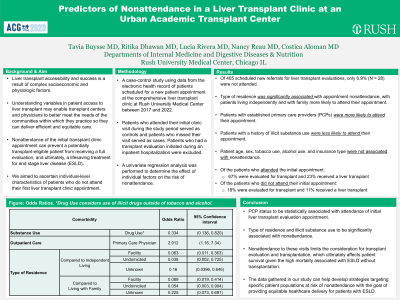Tuesday Poster Session
Category: Practice Management
P4058 - Predictors of Nonattendance in a Liver Transplant Clinic at an Urban Academic Transplant Center
Tuesday, October 24, 2023
10:30 AM - 4:00 PM PT
Location: Exhibit Hall

Has Audio

Ritika Dhawan, MD
Rush University Medical Center
Chicago, IL
Presenting Author(s)
Tavia Buysse, MD1, Ritika Dhawan, MD1, Lucia Rivera-Matos, MD2, Nancy Reau, MD1, Costica Aloman, MD1
1Rush University Medical Center, Chicago, IL; 2University of Louisville, Louisville, KY
Introduction: Liver transplant accessibility and success is impacted by complex socioeconomic and physiologic factors. Understanding variables in access to liver transplant may enable transplant centers to deliver more efficient and equitable care. Nonattendance of an initial transplant clinic appointment can prevent a patient from receiving an evaluation, and potentially, a lifesaving treatment for end stage liver disease (ESLD). We aimed to ascertain individual-level characteristics of patients who do not attend their first liver transplant clinic appointment.
Methods: A case-control study using electronic health record data from patients scheduled for a new patient appointment at a comprehensive liver transplant clinic at an academic medical center in Chicago, IL between 2017 and 2022 was performed. Patients who attended their initial clinic visit during the study period served as controls and patients who missed their visit served as cases. Patients with a transplant evaluation initiated during an inpatient hospitalization were excluded. A univariate regression analysis was performed to determine the effect of individual factors on nonattendance. IRB approval was obtained for the study.
Results: Only 6.9% (N = 28) of 405 scheduled new appointments were not attended. Type of residence was significantly associated with appointment nonattendance, with patients living independently and with family more likely to attend their appointment. Patients with established primary care providers (PCPs) were also more likely to attend their appointment. Patients with a history of recreational substance use were less likely to attend their appointment. Age, sex, tobacco use, alcohol use, and insurance type were not associated with nonattendance. Of the patients who attended the initial appointment, 67% were evaluated for transplant and 23% received a liver transplant compared to 18% and 11%, respectively, for patients who did not attend their appointment.
Discussion: Our study found PCP status was associated with attendance of initial liver transplant evaluation appointment, and type of residence and illicit substance use were associated with nonattendance. Nonattendance to these visits limits consideration for transplant evaluation, which ultimately affects patient survival given the high mortality of ESLD without transplantation. The data gathered in our study can help target specific patient populations at risk of nonattendance with the goal of providing equitable healthcare delivery for patients with ESLD.
Disclosures:
Tavia Buysse, MD1, Ritika Dhawan, MD1, Lucia Rivera-Matos, MD2, Nancy Reau, MD1, Costica Aloman, MD1. P4058 - Predictors of Nonattendance in a Liver Transplant Clinic at an Urban Academic Transplant Center, ACG 2023 Annual Scientific Meeting Abstracts. Vancouver, BC, Canada: American College of Gastroenterology.
1Rush University Medical Center, Chicago, IL; 2University of Louisville, Louisville, KY
Introduction: Liver transplant accessibility and success is impacted by complex socioeconomic and physiologic factors. Understanding variables in access to liver transplant may enable transplant centers to deliver more efficient and equitable care. Nonattendance of an initial transplant clinic appointment can prevent a patient from receiving an evaluation, and potentially, a lifesaving treatment for end stage liver disease (ESLD). We aimed to ascertain individual-level characteristics of patients who do not attend their first liver transplant clinic appointment.
Methods: A case-control study using electronic health record data from patients scheduled for a new patient appointment at a comprehensive liver transplant clinic at an academic medical center in Chicago, IL between 2017 and 2022 was performed. Patients who attended their initial clinic visit during the study period served as controls and patients who missed their visit served as cases. Patients with a transplant evaluation initiated during an inpatient hospitalization were excluded. A univariate regression analysis was performed to determine the effect of individual factors on nonattendance. IRB approval was obtained for the study.
Results: Only 6.9% (N = 28) of 405 scheduled new appointments were not attended. Type of residence was significantly associated with appointment nonattendance, with patients living independently and with family more likely to attend their appointment. Patients with established primary care providers (PCPs) were also more likely to attend their appointment. Patients with a history of recreational substance use were less likely to attend their appointment. Age, sex, tobacco use, alcohol use, and insurance type were not associated with nonattendance. Of the patients who attended the initial appointment, 67% were evaluated for transplant and 23% received a liver transplant compared to 18% and 11%, respectively, for patients who did not attend their appointment.
Discussion: Our study found PCP status was associated with attendance of initial liver transplant evaluation appointment, and type of residence and illicit substance use were associated with nonattendance. Nonattendance to these visits limits consideration for transplant evaluation, which ultimately affects patient survival given the high mortality of ESLD without transplantation. The data gathered in our study can help target specific patient populations at risk of nonattendance with the goal of providing equitable healthcare delivery for patients with ESLD.
Disclosures:
Tavia Buysse indicated no relevant financial relationships.
Ritika Dhawan indicated no relevant financial relationships.
Lucia Rivera-Matos indicated no relevant financial relationships.
Nancy Reau: Abbott – Advisory Committee/Board Member. AbbVie – Advisory Committee/Board Member. Arbutus – Advisor or Review Panel Member. Gilead – Advisory Committee/Board Member. Salix – Advisory Committee/Board Member.
Costica Aloman indicated no relevant financial relationships.
Tavia Buysse, MD1, Ritika Dhawan, MD1, Lucia Rivera-Matos, MD2, Nancy Reau, MD1, Costica Aloman, MD1. P4058 - Predictors of Nonattendance in a Liver Transplant Clinic at an Urban Academic Transplant Center, ACG 2023 Annual Scientific Meeting Abstracts. Vancouver, BC, Canada: American College of Gastroenterology.
